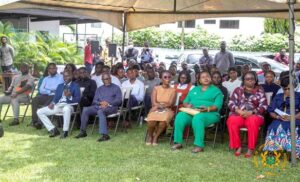By Kizito CUDJOE
Government is set to overhaul the existing mining policy regime as part of efforts to reset the country’s regulatory and economic direction, the Minister for Lands and Natural Resources, Emmanuel Armah-Kofi Buah, has said.
Speaking during a working visit to the Minerals Commission in Accra, one of the key agencies under his ministry, the minister described the current policy framework as outdated – pointing out that it has not seen a thorough review since 2014.
While acknowledging ‘commendable efforts’ by the Commission’s Chief Executive, Martin Ayisi, to introduce reforms, Mr. Buah made it clear that sweeping changes are necessary and urgent.
“My task is to move with the speed of light, working with you to overhaul the whole mining policy within the shortest possible time,” he told officials and staff at the Commission.
Ghana remains Africa’s top gold producer and is gaining ground in the critical minerals space. But the mining sector is faced by environmental degradation with rivers polluted and forests stripped bare, much of it tied to illegal mining activities across mining regions of the country.
Disturbingly, companies operating with licences from the Minerals Commission have also been implicated in irresponsible practices.

The minister, who was addressing officials and staff of the Commission, did not mince words: “We have to accept that there is something fundamentally wrong with the approach to licencing”.
He pointed to the current system of issuing prospecting licences as one of the major culprits behind widespread land degradation. Vast stretches of land are disturbed in the name of prospecting, only to realise there’s nothing commercially viable. This, he said, cannot continue.
As a remedy, he proposed a more focused approach. Under this new direction, only the Ghana Geological Survey Department – working closely with the Minerals Commission – will be authorised to carry out prospecting. Once potential deposits are confirmed, those areas can then be offered to interested companies for development.
Furthermore, he reiterated a need to reverse the approach in issuing mining licences; stressing a need to deepen stakeholder consultations before issuing licences.
The top-down approach to issuing licences, he insisted, must change to ensure the mining sector is well organised while guaranteeing sustainable and responsible practices.
The minister therefore entreated the Commission’s officials and staff to professionally discharge their duties and support these efforts to enhance regulatory activities of the mining sector.
The Minerals Commission CEO, in his welcoming remarks, acknowledged the mining sector’s contribution to the economy.
He said gold alone contributed about US$11.5billion to the country’s receipts last year. Of the amount, small-scale mining contributed US$4.6billion (40 percent) with the remainder, US$6.9billion (60 percent) coming from the large scale sector, according to the Bank of Ghana (BoG) and Ghana Statistical Service (GSS).
The mining sector contribution (gold) alone constitutes 56.3 percent of total receipts recorded by the country. Based on these figures, Mr. Ayisi contended that a quarter of the economy is small-scale.
He said these demonstrate the mining sector’s sensitivity and importance of the Minerals Commission’s work.
The minister later interacted with officials and staff of the Commission and also toured the facility’s control room.










